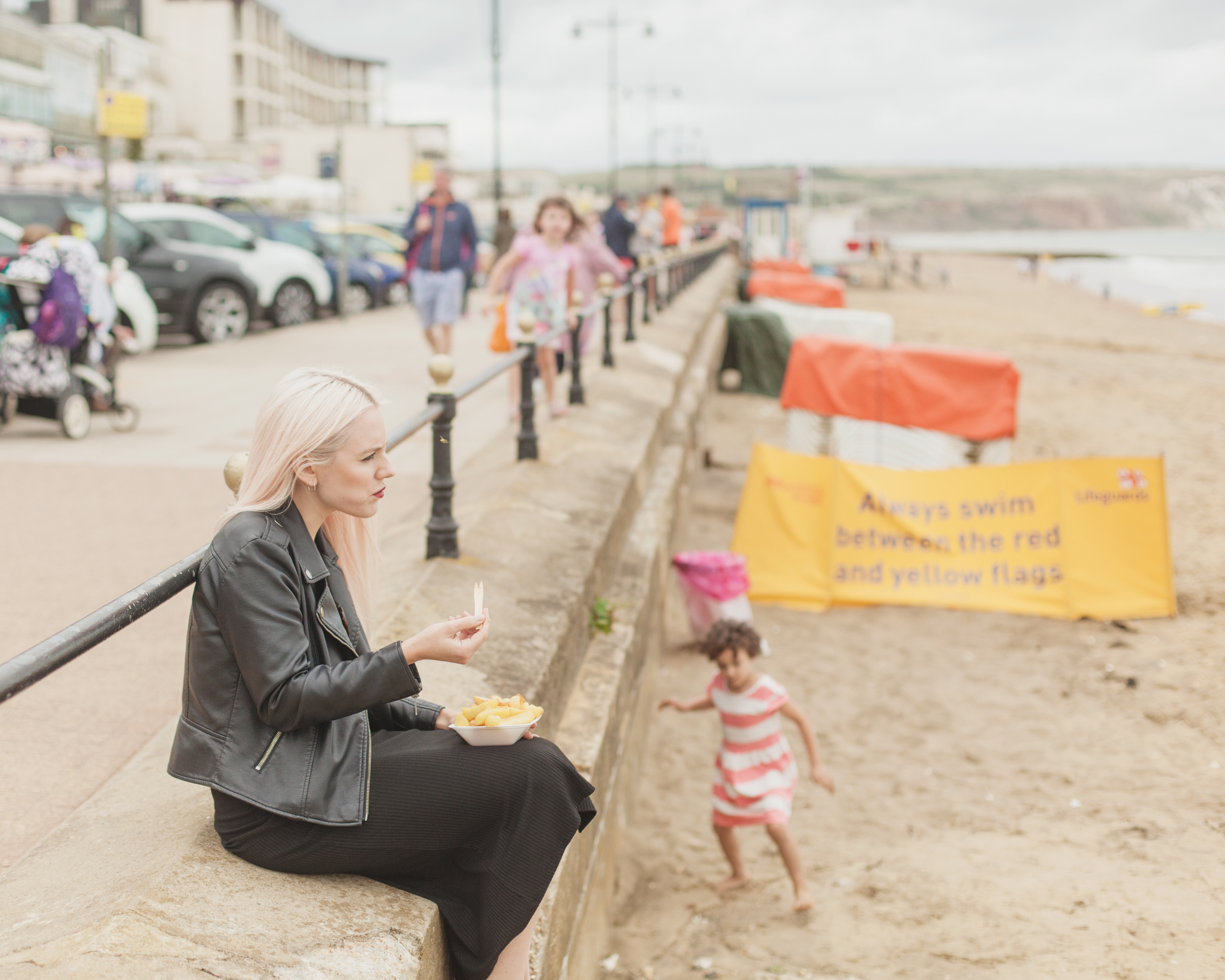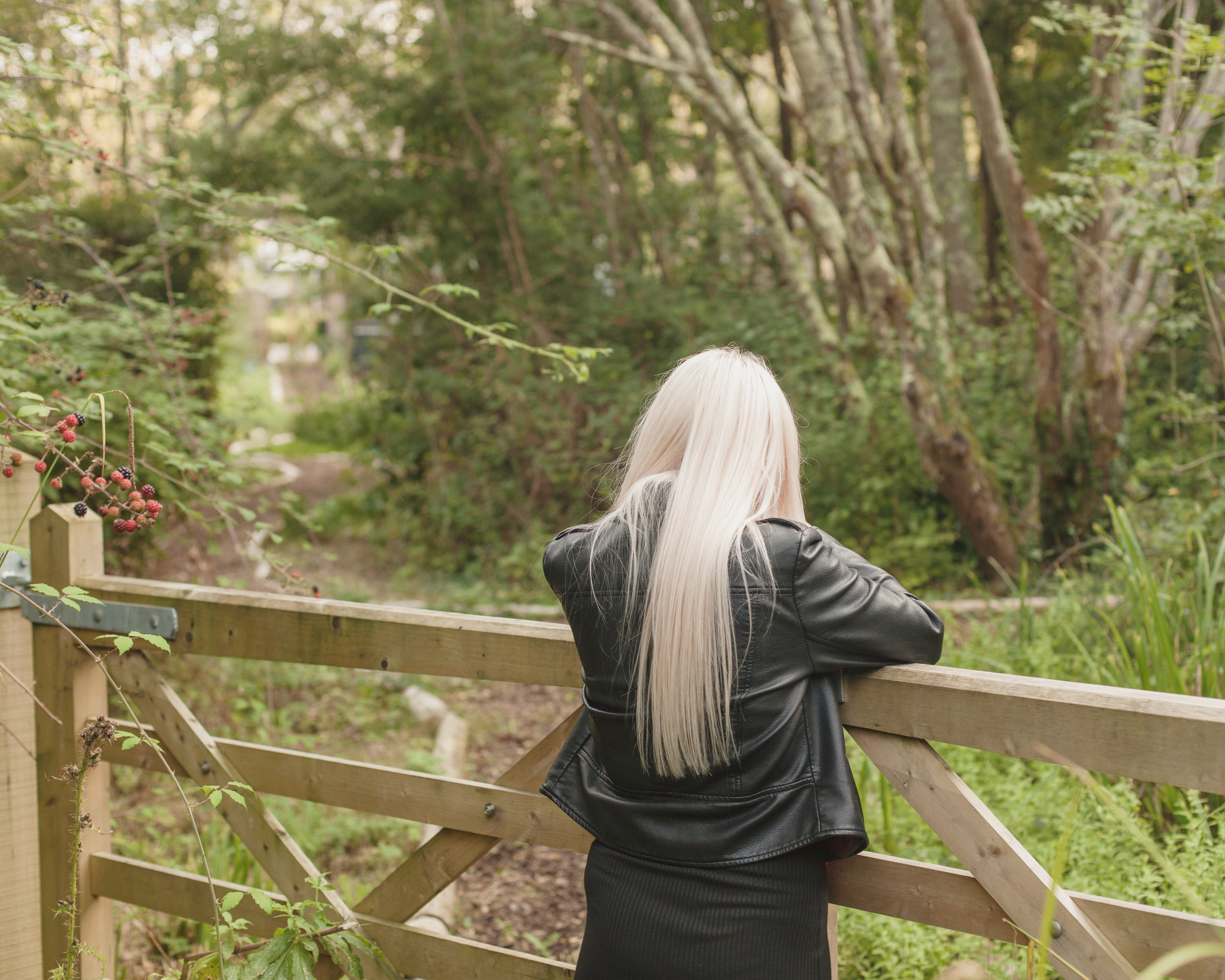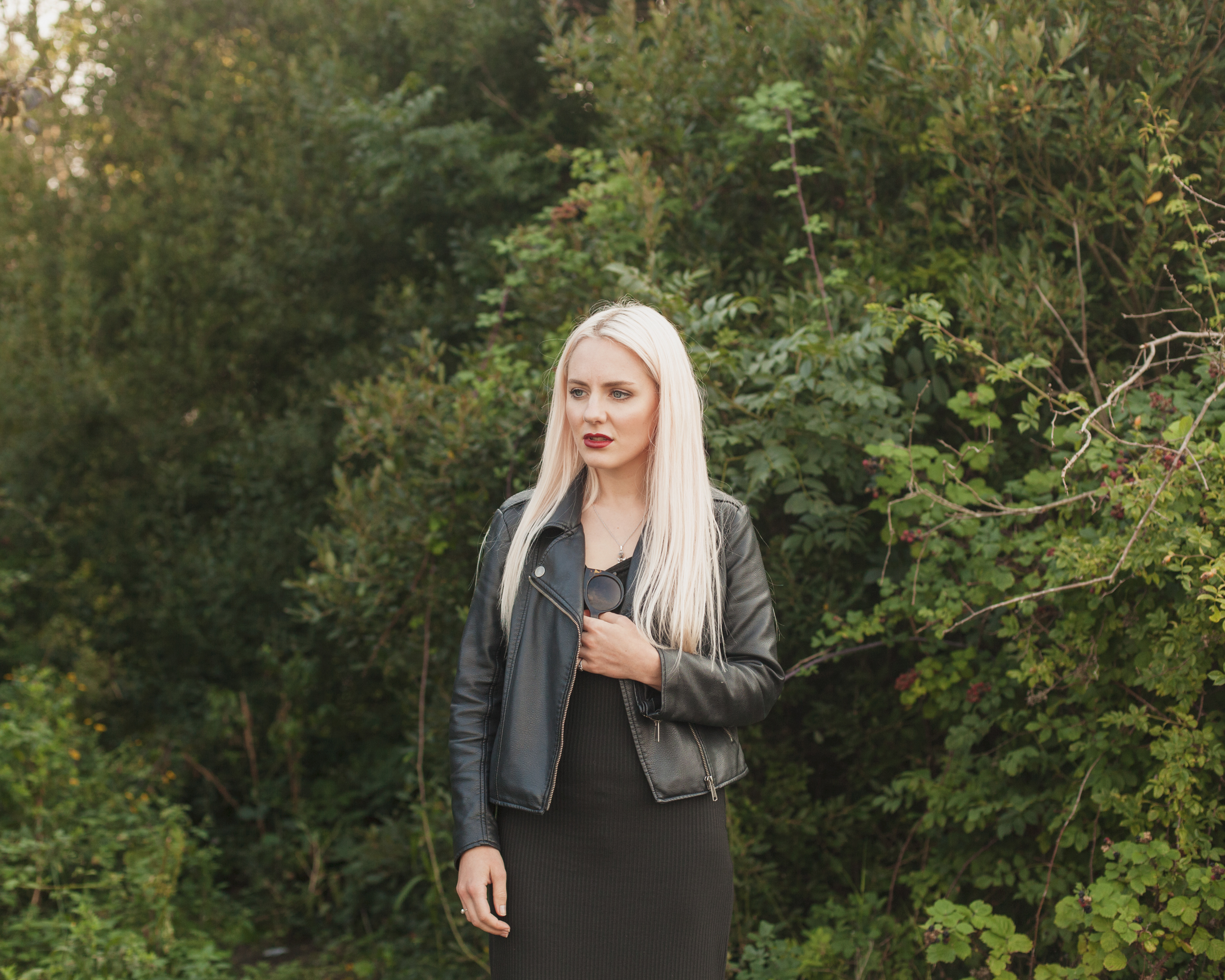A name can reveal something about its owner. Mine, Hannah: starts off laughing and ends up negative; an approximation of my emotional output. My home, the Isle of Wight: a population that’s 97.3 percent white. Everything is black and white. No space for fluidity, ambiguity or subtlety. People are straight or “gay”; one of us or one of them. Times are good or hard, the situation at hand right or wrong. The season is summer or “the other one” (only June to August matters when your economy relies on the fluctuating public desire to eat a 99 Flake).
Where I grew up, you can expect clarity on the basics if nothing else.
Videos by VICE

The island is shaped like a kiss, and I describe it to those unfamiliar with the place as “that dot as south as you can go on the map”. People occasionally confuse us with The Isle of Man, but whatever mad shit they do up there, it has nothing on what goes on down here. There’s a playground rumour that residents are inbred, a claim I cannot confirm or deny, and instead will refer you to the head of Ofsted, who called us an “inbred, poor, white ghetto”.
The island is small enough to walk from one side to the other in a day, but big enough that you’d never bother. Mobile reception isn’t as intermittent as it once was, and you can still pick up radio stations from France in the car (if you’re anything like me you watched Amélie at 12, got romantic ideas and started saying you were “practically French”). Red squirrels are everywhere since the crude grey ones chased them across the sea somehow, and now they, like Islanders, are trapped by (supposedly) the most expensive stretch of water to cross in the world. Nerds love it for being rich with dinosaur fossils, which according to Wikipedia has led to the nickname “Dinosaur Island”. Trust me, no one has ever called it that.
There’s only one nickname for the Isle of Wight, and that’s The Island. Everything that is not The Island is The Mainland. Either, or. Black, wight. As every man with a humanities degree has reminded me on dates, the person to give it this moniker was possibly Jane Austen, who wrote in Mansfield Park: “She thinks of nothing but the Isle of Wight, and she calls it the Island, as if there were no other island in the world.”


That’s truly how Islanders feel. If you’re a resident from The Mainland you’re called an overner, an abbreviation of “overlander”, an archaic term that literally means “outsider”. If you’re a resident born on the Island – deeply preferable – you’re a caulkhead. In ye olde days, Islanders would typically work “caulking” or waterproofing boats, so it’s said that caulkheads float. Local myth suggests you should drop a newborn baby into the Solent and see if it’ll drown. If they float, like a difficult woman in the middle-ages, they’re a true caulkhead. My two younger siblings were born caulkheads. I’d continually tease my sister, calling her one, and she’d go wild. She’d tear at my hair and say I would drown if I was thrown into a lake.
There are only two reasons you move here as an overner: to breed or to die. My parents took me from London to The Island in the mid-90s, like every other optimistic outsider family, because it looked like a quaint and crime-free place to raise children. And it was, sort of! A safe community that rears unusual folk. Because if all the above hadn’t been indication enough, The Island is a strange place.

Life trails 30 to 40 years behind the rest of the country here, and the shops that close on a monthly basis either look decrepit, with worn 70s signs, or parachuted in from a low-budget movie set, with garish fronts painted by the same local sign maker. Mood-wise, the Island is thoughtful and foreboding. Beautiful but isolated and a bit unhinged. Something is just off. It’s finding a photograph of a haunted Victorian child in a charity shop; the feeling after someone tells you “we need to talk”; seeing an ice cream van ride over the meadows on an overcast day; The Beach Boys’ “Wouldn’t It Be Nice” playing in an empty seaside café. Once upon a time we had witches and smugglers; now, we have a large and thriving Pagan population, an active dogging scene and conspiracy theorist David Icke. Lewis Carroll was greatly inspired by the Isle of Wight, and his stories were weird and horrible.
These events from my childhood summarise the vibe most accurately:
One summer the Island was plagued with myxomatosis, and every morning I woke up to find five to ten dead rabbits in our garden, pink eyes bulging from their sockets. My dad would go out early with a shovel and pick each one up like they were pizzas for a wood oven, and toss them into the adjacent woods, whistling to himself.
A teenage girl who’d gone to sketch was murdered and left naked in the quarry on the downs behind my house, and none of us girls were allowed to walk the 100 meters alone to primary school anymore.
With a notebook and binoculars, I once spied on the colony of wild goats with horns as thick as my thighs that roam the Island, as they were called in for their yearly health check. Quite Black Phillip from The Witch meets Animal Hospital.
An old man in an overcoat would ritually watch me and my sister on the trampoline from the neighbouring paddock of horses; one day I waved and he flashed at me in response.
At the local pub, my drunk grandad told a ghost story about the toe sucker of Brading – a local woman had apparently woken up to a man licking her feet – and a relative of the woman came over and told him to whisper because it’d been an altogether traumatic experience.

Brading is the creepy little town I lived in before my parents separated. It’s on the east side of the Island, where everything is. You don’t live in West Wight unless you’re preparing for the long sleep. There used to be a waxworks, most of which was dedicated to a torture chamber and filled with pallid models rotating on racks and getting their balls lopped off, soundtracked by a looped recording of agonising cries and yelps. It famously gave visitors “recurring nightmares” and shut down. There’s also “Little Jane’s Cottage”, the thatched home of another teen girl who died of tuberculosis, which, for posterity or something, has been kept preserved. And then a Doll and Toy Museum, which is exactly as unnecessary as it sounds.

Frequently, conversation will revolve around an Island issue that might be to do with the closure of one of these “iconic” attractions. If not that, then an argument about the proposed bridge connecting the Island to the Mainland: ruining the Island’s tranquillity versus encouraging tourism and providing Islanders with much-needed employment.
Or you’ll hear about the prisons. The Island has two notoriously tough jails – one of which has housed the Yorkshire Ripper, the Moors Murderer, Reggie Kray, men like that. Rumour was they were considering exclusively housing sex offenders. “They’re turning it into bloody paedo island,” residents and my family members and postman shouted at the time.
Then there are the more breezy talking points, like the first coffee chain opening, or whose brother is shagging whose sister.

What you have here – true of any rural and isolated area, really – is a lot of time to yourself. In the straightforwardness of local conversation and the overwhelming presence of nature, you have to provide your own emotional response. There is no omniscient narrator, so you have to be your own. Fill in the gaps. Fill in the silence (and there is so much silence). Walking about, feeling, thinking.

The vistas are so pretty it’s almost embarrassing. It’d be disingenuous to say I either appreciated or rejected that beauty growing up. Your surroundings are all you know, and you make the most of what you have. And we have The Needles, sublime white rock that could’ve been sliced with a sashimi knife. We have panoramic views over the Solent from Osborne House, where Queen Victoria lived. We have the sandy orange rocks of Compton Bay, which is deep West Wight. The Military Road tightly follows the water all the way to Compton – I’m going to be generous and say it’s the UK’s Pacific Coast Highway – its urgency only heightened by the fact it’s crumbling into the sea at a rate of a metre a year.

This is normal: The Island is shrinking. People will tell you they used to live “over there” and gesture two dozen metres out to sea. For centuries, we’ve had terrible coastal erosion, the pace of which is increasing as sea levels rise. The Island’s 110 kilometres of coastline is mostly protected with the sort of sea defences your geography teacher would have gotten glassy eyed over, but they’re old and not properly maintained, and there’s no money to improve them. But the best of us will float, so it’s fine?


Rather than hang out in Brading, I’d go to nearby Sandown. It’s like a rubbish Brighton with – surprise, surprise – an odd, old-timey vibe. Haunted pier, joke shop, rock dummies, head-in-a-hole boards that are problematic by 2018 standards, that sort of thing.
Sandown facilitated two hobbies: they had a library, so I could read, and a long cliffside promenade to cycle along fast, pretending to escape. When there with family, I’d sunbathe in baggy jeans and a hoody, hoping the rays would penetrate and obliterate my body in the process, and watch my mum bashfully flirt with the seafront chippy man, pretending not to want chips and then eating everyone else’s.

Once you’re a teenager, all the open space becomes simultaneously more oppressive and your own personal playground. Everything you can see is a party spot waiting to happen, provided you have alcohol and regularly snog someone with a car (public transport runs whenever drivers can be bothered, so infrequently).
This meant getting pissed with farmers; throwing burning balls of organic matter down country lanes; smoking weed in overturned boats; sharing cigarettes and stolen sweets in fields; and going to any of the beaches to do whatever teens find fun, which in the mid to late-2000s was shooting each other with super-soakers of pee, masturbating each other and getting driven home with sand in your pants.
During school holidays there’d be an influx of holiday home families (or DFLs; Down From Londons), so there’d be much excitement over whether so-and-so’s hot Tory cousin was back again. Or, if you were braver than me, you’d meet up with a Mainlander from Myspace with a bigger fringe than any Islander could envision.

We didn’t take part in the traditional British culture of fake IDs and underage clubbing, neither were we particularly fussed about turning 18. We had a nightlife of our own that had always worked.
Anyone in skinny jeans migrated to Ryde seafront with vodka and speakers, to dominate the grassy area near the castle. We had no “real” gigs – the boats to Portsmouth or Southampton were as much as the ticket to the show – but there was the Church On The Roundabout, which was exactly what it sounds like. The Christians would let us grotty teens put on hardcore shows provided their house band played the bill too. They did a Robbie Williams ”Angels” cover every time and replaced the word angels with Jesus, so besides each other and cider and sex we were loving Jesus instead.

Better than Ryde or house parties, the landscape allowed for extended weekend adventures that parents never knew about. My favourite place was Woodside. You could only reach this concrete platform next to the sea by venturing through an abandoned holiday park, ripping your trousers and cutting your arms on the bramble, a nightmarish initiation ceremony.
We’d set up tents around the static homes, and light fires on the concrete, smoke weed and play music loud enough to echo. The tide would be high, threatening to spill over, and you could see the Mainland like fairy lights on the horizon. Now, the woodland has been cleared, the empty homes removed, and a sparkling new yuppy holiday home is in its place, obviously.


The older you get, the more you turn outward towards the Island’s borders. You can get drunk anywhere, and always end up looking past the sea, feeling lost or furious at everything that keeps you here. Wherever you go, you’re maximum 20 minutes from water, but probably only five or ten. You are caved in, screaming across. It’s adolescence at its most literal: you are small and the world is big.

The Island is at once expansive and trapping. Take someone for a deep meaningful conversation down by the beach and the water draws out the emotion before you’ve even asked, “So, how’ve you been?”

You think that where you grow up doesn’t stick to your bones, but it does. The kids who did the most fist-shaking at the waves were just as likely to leave at 18 to much fanfare, become shellshocked and return quietly. The Island, it makes us weird, you see. Naturally, I now want to justify moving away from London and go very rural, back to everything strange. I think about open bodies of water daily, I’m drawn to them. I need to be in nature, to feel very small. More than anything, I want the lack of stimulation, the silence.
What I’m probably saying is: Take me home to the sea, dump me in it and let me look at everything I think I’m missing.
More
From VICE
-

Screenshot: Metavision Studios -

Image: Into Games/Slow Game Club -

Photo: Annette Birschel/picture alliance via Getty Images -

Gilbert Flores/Penske Media/Getty Images
